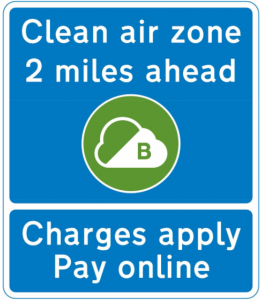Bath’s Clean Air Zone has been recognised for improving the city’s air quality in the latest government inspection of the scheme, which had its third anniversary last week.
Bath and North East Somerset Council, which brought in what was then the first charging zone of its kind outside of London, hailed the research, saying it proved the scheme was reducing harmful levels of air pollution caused by the most polluting vehicles.

The latest report says the zone had helped sustain air quality improvements in Bath for two consecutive years.
The government’s Joint Air Quality Unit (JAQU), which independently reviewed the council’s own research, has officially declared that the council has passed its ‘state 3’ assessment, the UK’s first charging clean air zone to do so.
State 3 is achieved when a local authority has two consecutive years of low measurements of Nitrogen Dioxide (NO2), an invisible harmful pollutant which has a damaging effect upon public health.
Concentrations are highest at the roadside due to the high contribution road traffic has on NO2 levels.
The report found there was an average reduction of 27% in annual mean NO2 concentration between 2019 and 2022 in Bath.
It also revealed there were no observations of increased annual mean NO2 concentration across all Bath’s 125 test sites, with one site on Upper Bristol Road having the largest decrease in NO2 concentration.
However, the report cautions against a high risk of exceeding the limit in future years, as national traffic data suggests an increase of traffic last year while commercial vehicle fleets have not been replaced by cleaner vehicles at the rate expected due to the impact of the Covid-19 pandemic.

The reopening of Bath’s Cleveland Bridge at the end of 2022 also means last year’s traffic flow data is likely to be higher – although the report noted that the Clean Air Zone was still encouraging drivers to upgrade to cleaner vehicles faster than the natural upgrade rate.
Older vehicles which do not meet Euro 6 diesel or Euro 4+ petrol emissions standards contribute more towards higher NO2 levels.
Drivers of these higher polluting vehicles pay £9 (taxis, minibuses and vans) or £100 (HGVs, coaches and buses) to drive in the zone. The charge does not apply to private cars or motorcycles.
The council is continuing to monitor air quality and traffic flow alongside promoting sustainable travel to help maintain air quality improvements.
Council deputy leader and cabinet member for climate emergency and sustainable travel Sarah Warren, pictured, said: “It is great to see that all our efforts to improve air quality both inside and outside the zone continue to work.
“We have worked hard to improve air quality within our communities and as we approach our third anniversary of the CAZ, it is pleasing to see that we have sustained these improvements over two consecutive years and been recognised by government for this.
“Everybody has the right to breathe clean air – it is clear, we must continue to lead on building a sustainable future and work to continue to drive down pollution levels further to help protect and improve the health of our residents and visitors.”




















